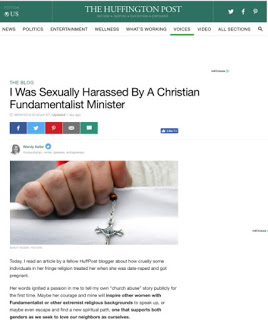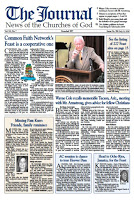
It always amazes me when people don't "get" the problem with the way Joe Tkach's GCI is set up.
"As for the board members, who should they be? Who would be the voting populaton [sic]? The general membership of GCI? Should there be the travesty like our current national elections carried out in GCI?"
GCI isn't a private company, it's supposed to be a church, a non-profit. It claims a membership. A church needs lines of accountability that ensure that membership is fairly served. It needs officers who serve at the membership's pleasure. It needs lines of accountability that flow both ways - no just accountability of the "members" to the leaders, but even more importantly the leaders to the members.
The Episcopal Lie
GCI claims to be organized on an episcopal basis. That's a fiction. There was no talk of any such thing until the receivership crisis. Prior to that WCG (as it was then known) operated on a legally different basis. Not that it lived up to those obligations; that was one of the big issues that underlay the action by the State of California. The near-papal claims that then conveniently emerged - and the reorganization as a corporate sole - were little more than a ruse to avoid its obligations. Joe Tkach has maintained the lie despite the fact that there is no appetite in GCI for a return to the old Armstrong ways.
Have a look at other church bodies, both in North America and throughout the Western world. Presbyterian, Baptist, Episcopal (yes, even the Episcopal Church), Lutheran, Adventist, Methodist. Add in the Church of God (Seventh Day) for something more directly related to GCI. All have some form of representative structure varying from General Conferences to delegated Synods. Even the Mormons go through the motions. GCI? Not.
It's entirely moronic to imply that because a particular political system has flaws, therefore members of a church should be deprived of their rights and the leaders effectively given carte blanche to do as they please. No system is perfect, but some are clearly much better than others. There's a wide range of helpful models out there used by various denominations. One thing is for sure, GCI's is among the very worst. It takes some swallowing, but both LCG and UCG do a better job in transparency (though their structures continue to deny basic lines of leadership accountability).
But Joe and Co. are nice guys
It's not an issue that a Board has some decent members. Joe has been careful in that respect, apart from larding it up with Tammy. The issue is - is it a real board, capable of independent action and hauling the church's officers into line when necessary? Or is it a collection of carefully selected yes-men and yes-women beholden to the "owner", serving at his pleasure. And exactly who do those board members represent given that they're appointed not elected.
Questions that need clarification
Wouldn't it be wonderful if one of those hand-picked board members responded to the following questions and set any misunderstandings at rest?
1. Who is Joe accountable to?
2. Who is the Board accountable to?
3. Who has (and hasn't) access to the financial statements?
4. Who has (and hasn't) access to Board minutes?
5. What exactly is the legal status of the GCI "members"?
My understanding - and I hope I'm mistaken or years out of date - is:
1. Technically the Board. In reality no-one.
2. Joseph Tkach Jr.
3. Almost nobody. In contrast to UCG and LCG which, dubious as their organizations might be in other ways (and I'm a fan of neither), have a solid record of reporting to their memberships - and in fact anyone else who cares to view them.
4. Almost nobody. In contrast to UCG which publishes minutes online for all to see.
5. They have no real status or rights. Apart from some limited local input, denominational decisions are taken over the tops of their heads entirely. You could describe them as "stakeholders" or "clients". Members? Not really.
Again, I'd be delighted to correct any misunderstandings on my part. The challenge is for Joe or any of his Board members to set the record straight. One lives in hope, but I won't be holding my breath.
A company - unless it's a small family firm - has shareholders. The shareholders meet to determine and approve company policy. GCI doesn't even allow that. No shareholders except Joe and ... who knows.
The Bottom Line
A Christian Church isn't a family firm. It isn't a commercial business. It isn't a personal fiefdom. It shouldn't be run like North Korea. Members are entitled to a voice and representation or they're not really members. Whether or not the "Beloved Leader" postures as a model of benevolence or not is beside the point.









